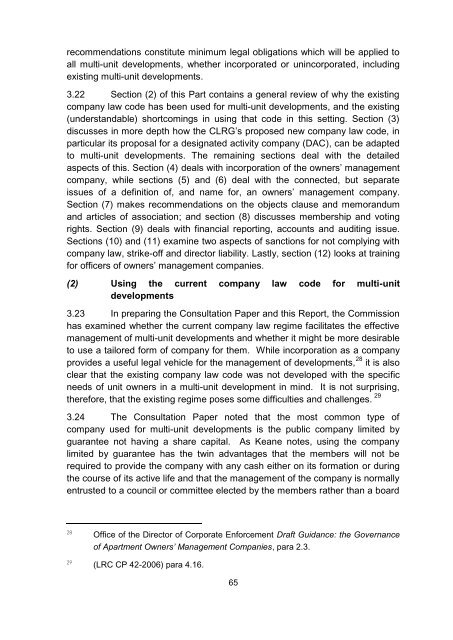Report on Multi-Unit Developments - Law Reform Commission
Report on Multi-Unit Developments - Law Reform Commission
Report on Multi-Unit Developments - Law Reform Commission
Create successful ePaper yourself
Turn your PDF publications into a flip-book with our unique Google optimized e-Paper software.
ecommendati<strong>on</strong>s c<strong>on</strong>stitute minimum legal obligati<strong>on</strong>s which will be applied to<br />
all multi-unit developments, whether incorporated or unincorporated, including<br />
existing multi-unit developments.<br />
3.22 Secti<strong>on</strong> (2) of this Part c<strong>on</strong>tains a general review of why the existing<br />
company law code has been used for multi-unit developments, and the existing<br />
(understandable) shortcomings in using that code in this setting. Secti<strong>on</strong> (3)<br />
discusses in more depth how the CLRG‘s proposed new company law code, in<br />
particular its proposal for a designated activity company (DAC), can be adapted<br />
to multi-unit developments. The remaining secti<strong>on</strong>s deal with the detailed<br />
aspects of this. Secti<strong>on</strong> (4) deals with incorporati<strong>on</strong> of the owners‘ management<br />
company, while secti<strong>on</strong>s (5) and (6) deal with the c<strong>on</strong>nected, but separate<br />
issues of a definiti<strong>on</strong> of, and name for, an owners‘ management company.<br />
Secti<strong>on</strong> (7) makes recommendati<strong>on</strong>s <strong>on</strong> the objects clause and memorandum<br />
and articles of associati<strong>on</strong>; and secti<strong>on</strong> (8) discusses membership and voting<br />
rights. Secti<strong>on</strong> (9) deals with financial reporting, accounts and auditing issue.<br />
Secti<strong>on</strong>s (10) and (11) examine two aspects of sancti<strong>on</strong>s for not complying with<br />
company law, strike-off and director liability. Lastly, secti<strong>on</strong> (12) looks at training<br />
for officers of owners‘ management companies.<br />
(2) Using the current company law code for multi-unit<br />
developments<br />
3.23 In preparing the C<strong>on</strong>sultati<strong>on</strong> Paper and this <str<strong>on</strong>g>Report</str<strong>on</strong>g>, the Commissi<strong>on</strong><br />
has examined whether the current company law regime facilitates the effective<br />
management of multi-unit developments and whether it might be more desirable<br />
to use a tailored form of company for them. While incorporati<strong>on</strong> as a company<br />
provides a useful legal vehicle for the management of developments, 28 it is also<br />
clear that the existing company law code was not developed with the specific<br />
needs of unit owners in a multi-unit development in mind. It is not surprising,<br />
therefore, that the existing regime poses some difficulties and challenges. 29<br />
3.24 The C<strong>on</strong>sultati<strong>on</strong> Paper noted that the most comm<strong>on</strong> type of<br />
company used for multi-unit developments is the public company limited by<br />
guarantee not having a share capital. As Keane notes, using the company<br />
limited by guarantee has the twin advantages that the members will not be<br />
required to provide the company with any cash either <strong>on</strong> its formati<strong>on</strong> or during<br />
the course of its active life and that the management of the company is normally<br />
entrusted to a council or committee elected by the members rather than a board<br />
28<br />
Office of the Director of Corporate Enforcement Draft Guidance: the Governance<br />
of Apartment Owners‟ Management Companies, para 2.3.<br />
29<br />
(LRC CP 42-2006) para 4.16.<br />
65

















